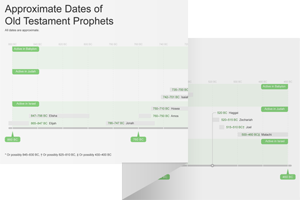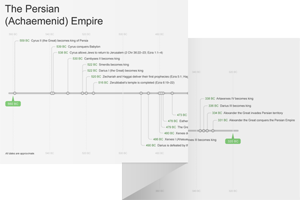1:1–8:23 Zechariah |
1:1 eighth month Corresponding to late October and early November. Zechariah’s ministry began about a month before Haggai received his final vision (see Hag 2:10, 20).
 Israelite Calendar Table
Israelite Calendar Table
the second year of Darius 520 bc. Darius I Hystaspes ruled Persia from 522–486 bc (see note on Hag 1:1). The visions of Zech 1–6 date to the same period as the events in Ezra 4:24–6:13.
the word of Yahweh A standard introductory formula used by the prophets to indicate that they were communicating God’s words, not their own (e.g., Hos 1:1; Joel 1:1; Mic 1:1; Hag 1:1; Zeph 1:1; see note on Isa 1:10).
 Prophetic Commissioning and the Divine Presence
Prophetic Commissioning and the Divine Presence
the prophet A prophet is a spokesperson for God (see note on Mic 3:5).
Zechariah A member of one of the priestly families of Judah. His name means “Yahweh remembers.” His grandfather Iddo had returned from the exile with Zerubbabel (Neh 12:1–7). Zechariah eventually became the head of the priestly clan of Iddo (Neh 12:16).
eventually became the head of the priestly clan of Iddo (Neh 12:16).
1:2 your ancestors Refers to the pre-exilic generations whose sin against Yahweh brought on His judgment and led to the destruction of Jerusalem and the temple.
1:3 Yahweh of hosts The title emphasizes Yahweh’s role as commander-in-chief of the heavenly armies, evoking the metaphor of Yahweh as a warrior (see 1 Sam 17:45).
Return The Hebrew term used here conveys the idea of repentance (e.g., Jer 25:5; 35:15; Mal 3:7).
1:4 the former prophets Refers to the pre-exilic prophets, whose warnings of impending judgment and calls to repentance were routinely ignored.
Return from your evil ways A general description of the words of the prophets (see Isa 31:6; Jer 3:22; Ezek 18:30). Zechariah probably isn’t referring to a specific prophet, but the call to return evokes the essence of Jeremiah’s preaching (see Jer 15:19; 18:11; 25:5; 35:15).
 The Significance of “Shuv” in Jeremiah
The Significance of “Shuv” in Jeremiah
1:5 Your ancestors, where are they A rhetorical question indicating that the nation’s ancestors had long since passed away.
the prophets, do they live forever This rhetorical question demonstrates that the former prophets have died.
1:6 my words and my regulations The total body of divine revelation. Refers to the words spoken by prophets and the Law.
And they repented The survivors who had gone into exile repented after experiencing judgment (see Jer 31:18–19).
so he has dealt with us The remnant acknowledged that they deserved their judgment.
1:7–6:8 This passage records eight visions that appear to be in a rough chronological sequence stretching from the time of writing to the coming of the Messiah. The overriding theme of the visions is the expectation of the coming Messiah. This first vision seems to parallel the eighth vision (Zech 6:1–8), as both feature four kinds of horses. The remaining visions also seem to be structured in parallel, in order to present the oracle about the messianic Branch (3:8–10) as the central point of chs. 1–6. The first vision in vv. 7–17 is a pronouncement of hope for the nation. Yahweh promised to put an end to Jerusalem’s 70 years of misery and return the people to the city with comfort and compassion. |
1:7 the twenty-fourth day of the eleventh month The vision dates to January or February of 519 bc, a few months after the message delivered in vv. 1–6.
1:8 a man riding on a red horse The first vision is dominated by this figure of the angelic horseman. This figure is sometimes referred to as “man” (vv. 8, 10) and other times explicitly identified as the Angel of Yahweh (v. 11). Similar imagery is used in Rev 6:4. He appears to be distinct from the angelic messenger guiding Zechariah through the vision (Zech 1:9, 13–14).
myrtle shrubs A fragrant tree whose branches were often used in connection with the Feast of Tabernacles (Neh 8:15). Isaiah depicts myrtle replacing nettle (a desert plant) in the renewal of creation accompanying Yahweh’s salvation of His people, often taken to refer to the establishment of the Messiah’s reign (Isa 55:13).
reddish-brown A brownish orange to light brown color.
1:9 the angel An angelic messenger, probably distinct from the Angel of Yahweh in this instance.
The Hebrew term mal'akh, often translated “angel” or “messenger,” is used more than 200 times throughout the ot to identify human messengers, angelic messengers, and the divine Messenger (the Angel of Yahweh; see Gen 16:7; Exod 3:2; Judg 13:21). |
1:11 the angel of Yahweh Identifies the man in Zech 1:8 and 1:10 as the Angel of Yahweh.
all the earth is dwelling in peace Based on the angel’s reaction in v. 12, the report that the earth is at rest is likely critical of the nations’ selfish inactivity (compare Isa 30:7; Jer 48:11; Ezek 16:49). The historical setting of this peace is probably the political stability brought about by the consolidation of the Persian Empire under Darius.
under Darius.
1:12 how long will you have no compassion on The angel’s question alludes to earlier prophetic messages about the nature and extent of God’s displeasure with His people (see Isa 6:11–13; Hos 1:6–7).
these seventy years The nation had been afflicted for 70 years in fulfillment of the prophecies of Jeremiah (see Jer 25:11–12; 29:10). The angel’s request indicates that the return of exiles from Babylon did not necessarily mark the fulfillment of the 70 years. See note on Ezra 1:1; Jer 25:11.
1:14 I am very jealous for Jerusalem Yahweh is fiercely protective of His people and expects their loyalty.
1:15 nations that are at ease Yahweh’s anger against Judah is subsiding, and the time for judgment upon the nations is drawing near. Compare Zech 1:11 and note.
they furthered disaster The nations made Yahweh’s judgment on Israel even more severe.
1:16 with compassion God’s displeasure with His people was temporary. The language of restoration in vv. 13–17 fulfills promises such as Jer 31:20 (compare Isa 40:1–2; Hos 2:1).
My temple Refers to the temple. The fulfillment of Yahweh’s promise for restoration lies in the rebuilding of the temple and the city. Compare Zech 4:9; Ezra 6:14.
a measuring line A device used in construction to determine precise measurements. The measuring line was used in both construction and demolition, making the image useful as a metaphor for both judgment (e.g., 2 Kgs 21:13; Isa 34:11; Lam 2:8) and restoration (compare Isa 34:17; Ezek 40:3).
1:17 will comfort Zion again The Hebrew term used here is often used to describe Yahweh’s post-judgment attitude toward His people. Compare Isa 12:1; 40:1; Jer 31:13.
The Hebrew word nacham, often translated “comfort,” can describe regret, remorse, comfort, compassion, or consolation. The theme of divine comfort and restoration of God’s people following their punishment is prominent in prophetic salvation oracles (e.g., Isa 12:1–6; 40–66; Jer 31). The experience of judgment or suffering is often characterized by a lack of comfort (see Lam 1:2, 9, 16–17, 21; Job 16:2; Psa 69:20). The basic sense of nacham is that of sympathy or comfort offered in response to a death (Gen 37:35) or other calamity (Job 42:11), but the term usually connotes more than mere empty words of comfort, implying tangible help offered to someone suffering loss (Pss 23:4; 86:17). |
he will choose Jerusalem Alludes to 2 Chronicles 6:6. Compare Zech 2:12. See note on 2 Chr 6:6.
1:18–21 Zechariah’s second vision depicts God’s judgment on the nations that were responsible for the dispersion of the Israelites. |
1:18 four horns Animal horns are a common ancient Near Eastern symbol for political and military power. See 1 Sam 2:1, 10; Pss 18:2; 75:10; Jer 48:25; Mic 4:13; compare note on Ezek 29:21; note on Dan 7:7.
1:19 the horns that have scattered Represents the nations that used their power to scatter the Israelites across foreign lands.
Israel Refers to the northern kingdom.
1:20 skilled craftsmen This refers to skilled laborers, including carpenters, blacksmiths, jewelers, and stonemasons.
1:21 them, to strike down the horns of the nations Yahweh sends four craftsmen to destroy the four horns.
that lifted a horn Compare Zech 1:19.

|
About Faithlife Study BibleFaithlife Study Bible (FSB) is your guide to the ancient world of the Old and New Testaments, with study notes and articles that draw from a wide range of academic research. FSB helps you learn how to think about interpretation methods and issues so that you can gain a deeper understanding of the text. |
| Copyright |
Copyright 2012 Logos Bible Software. |
| Support Info | fsb |
 Loading…
Loading…



 Mal’akh
Mal’akh 